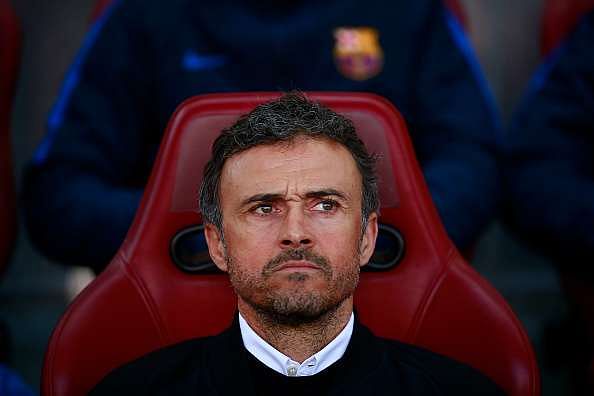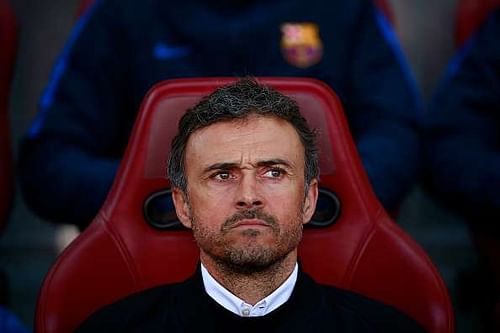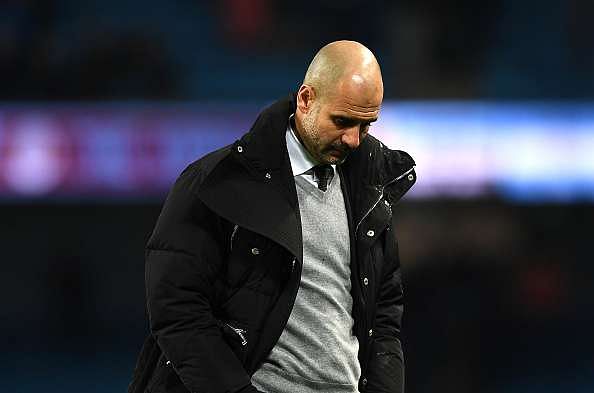
Barcelona – The impossible job
It was the weight of expectations, the demands of success without interruption, that eventually forced Pep Guardiola to leave Barcelona in 2012 after a life-long attachment. His well-documented four-year managerial tenure brought 14 trophies to the Camp Nou, and his first managerial appointment was blessed by the fact that he inherited the likes of Xavi, Iniesta, Messi and others at the peak of their powers.
For those looking in, it was an easy job. La Liga's lesser entities show little attacking ambition against the likes of Barcelona, holding on for a draw from kick-off, inevitably failing. Guardiola, influenced by Johan Cruyff, had his own high standards, his own demands, and his squad of players had the ability and understanding to implement his beliefs to perfection in a team that defined a generation. But Guardiola still quit. That unparalleled success was not enough, but also too much.
Luis Enrique is the latest figure to occupy the Camp Nou hot seat, and the pressure has been on the former attacking midfielder from the beginning. Why? Because this is Barcelona, and this is what it means to manage Barcelona. He may not have the combination of Xavi and Iniesta orchestrating matters from the middle of the field, but he has the formidable forward line of Messi, Suarez and Neymar, which is enough to make every other manager in the world game envious of the players at his disposal.
A club that demands results as well as perfection
His side is miraculously still in the UEFA Champions League following their heroics against Paris Saint-Germain, but is it enough? Enrique casts the figure of a manager struggling for form at the wrong end of the table with a string of injuries and suspensions, and while the manner of the success over the Parisians brought an emotion rarely witnessed, reality quickly returned.
Barcelona prides itself on being more than a club. 'Mes Que un Club'. But the level of expectation now extends not only beyond results, but also beyond performances, and to a permanent state of perfection. The culture that surrounds the club in this generation demands a performance that displays the values that Cruyff brought over from Holland, fine-tuned by Guardiola, but even when the performance is at its best, it must still have the result.
The win. The victory. More often than not, Barcelona achieve both, their talent and resource ensures that it happens on a regular basis. They are simply better than the rest. But this is sports, not theatre, this is football. The game is built upon the element of surprise, the shock result, the small chance that gives every team their day, the chance to dream. But Barcelona do not accept anything but perfection, always.
And as a result, managers come, and then they go. It is beyond the capability of any manager to create a state of unalterable perfection in a team. No Barcelona manager can ever escape criticism. And it is that weight of demand that has forced the very best to move away, failed by the high standards that they set for the team, those that they please expecting the same, always.
Also read: 5 Barcelona legends you haven't heard of
A new chapter
A new manager will take charge of Barcelona next season, Enrique will depart for a new club, possibly abroad, away from Spain, away from the press that will constantly analyse and compare him with his successor like they already do now with his predecessors. He may join the likes of Guardiola and Mourinho in England, he may head to China, the United States, there will be offers. Lucrative both financially and in terms of potential career success.
Guardiola recently beamed with pride as his Manchester City side played to his vision in a 1-1 draw against Liverpool. He could make such a statement in England, but in Barcelona, there is no performance without the result, and no result without the performance, always.
But if pleasing the Catalan crowd is one thing, pleasing the squad of players that the new manager will inherit is another. Gerard Pique, Lionel Messi. These are the people that run the club. These are the people that ultimately decide who fits in, who doesn't. They have the support of millions around the world, their word is listened to, and if they are happy then the crowd are happy. If they protest, they have their way.
Other clubs have seen disruptive players quickly depart following the arrival of a new manager, their protestations work against them and offer the manager a golden opportunity to make an impression on the rest of the squad. If he can go, then anyone can go. The well-documented stand-off between Jose Mourinho and legendary captain Iker Casillas at Real Madrid is a popular case study to support such a theory. And the new manager inevitably wins.
But this is Barcelona, and it is different. The new manager follows the rules that he inherits, the buys into the culture ingrained at the club, his remit is to attempt to create the impossible and leave when he fails, but collect trophies along the way. He has to keep the players happy, not the reverse. He has to keep the fans happy at all times, he cannot. But that is the impossible job that years of evolution under the likes of Cruyff and Guardiola have created for this incredible and unique club.
It will take generations to change, to return to reality, to embrace realistic expectations. Players also experience the demands, they know that ultimately they cannot win in the long-term. They will take the plaudits after a big win from an incredible performance, but each time it only sets the bar that little bit higher, and eventually it becomes too high. Barcelona are playing to a level that even they can no longer reach, but the demands remain, and they always will.
Also read: La Liga 2016/17 - Analysis of Lionel Messi, Luis Suarez and Cristiano Ronaldo's scoring patterns

